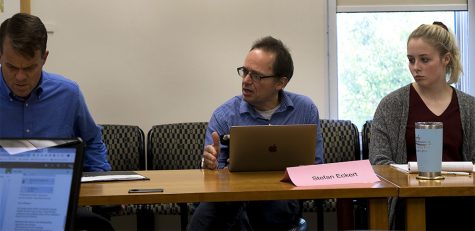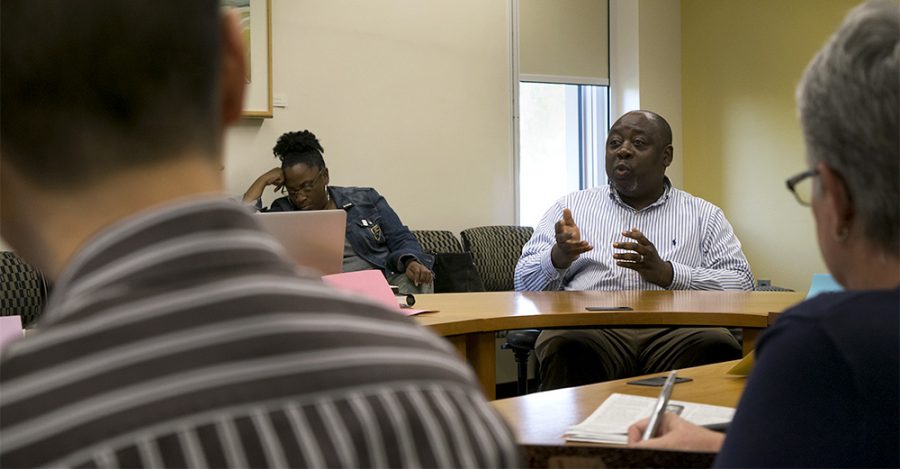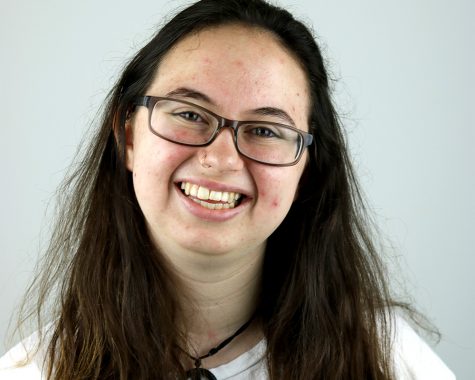Faculty Senate explores specifics of potential university think tank
Brooke Schwartz | The Daily Eastern News
Mutombo Kabasele is the associate dean of the office of international students and scholars. He updated the Faculty Senate on international student enrollment and the process it takes to get them to Eastern.
October 31, 2018

Stefan Eckert is a Faculty Senate member and a music theory professor. The senate meets every other Tuesday at 2 p.m. in room 4440 of Booth Library.
Faculty Senate discussed the specifics of a university think tank, a more specific shared governance resolution and an update on international students at its meeting on Tuesday.
The idea of a think tank, which would focus on macro ideas and trends in higher education and would look at Eastern’s future, was first discussed by the Workgroup No. 8 and 9 Review Committee last fall and was later discussed in a Jan. 9, 2018 Faculty Senate meeting.
At the senate’s Oct. 17 meeting of this semester, it decided on a potential makeup and a timeline for the first trial run of the think tank.
This committee was first proposed because of some common criticisms of the vitalization project.
During the vitalization project, originally proposed by Eastern President David Glassman in 2016, different workgroups made recommendations for programs in various areas around campus.
These recommendations included programs that could be outsourced, consolidated or deleted, ways programs could reduce costs and inefficiencies and improvement plans to develop other programs.
A common criticism of these workgroups was that many of these recommendations were made in the span of one semester under what was a lot of pressure for colleagues and administrators.
Teshome Abebe, a senate member and economics professor, said the history of the vitalization progress is why this committee should be important to faculty.
“This is not a committee for reward purposes,” Abebe said. “This (committee) came from a discussion we had on this campus, and that discussion led us to conclude, at least some of us, and particularly the senate, to conclude that we shouldn’t be making continued decisions under harassment, under conditions of difficulty; we should be anticipating some problems as we go along.”
Billy Hung, senate recorder and biological sciences professor, drafted a proposal after the Oct. 17 meeting which specified that the committee would be made up of four appointed administrative positions, two of which will be filled by Eastern President David Glassman and Provost Jay Gatrell, and four nominated faculty positions along with, or including, a potential student position, and a three-year term for the members who populate the committee for the trial run of it.
After reviewing the draft Hung wrote, senators said they had concerns with specifying the size and makeup of a committee like this, one that is supposed to be more flexible and creative.
The senate decided to scrap language in the proposal that seemed too specific, such as the specific makeup of the committee and the requirement of that committee to have an annual campus-wide presentation.
The proposal will be re-examined at the senate’s next meeting on Nov. 13.
Abebe said the most important thing to remember is this committee is coming out of the faculty.
“The crucial aspect of this is not really the (three-year) time period. The crucial aspect of this is this is a faculty initiative; that’s No. 1. It’s not an initiative from administrators, which can be very political. We’re trying to keep it away from that; it doesn’t have the power of a contract; it’s not backed by a contract,” Abebe said. “It’s not backed by anything except the initiative of the faculty, and that is what we need to keep in mind.”
At the last senate meeting on Oct. 17, a new proposal, which came out of the shared governance discussions, was debated.
The more specified proposal that was talked about on Oct. 30 said the senate’s involvement in looking at the resource allocation and mission alignment of new programs requiring Illinois Board of Higher Education approval would come in the form of Gatrell’s report to the senate.
Gatrell, who currently meets with proposers of new programs to discuss just that, will report to the senate after his meeting.
The codification of this will come after the senate discusses more planned constitutional changes on Nov. 13.
Hung said he likes the idea of having a more defined senate role somewhere in their constitution.
“This is essentially what we’ve been talking about with (the Council on Academic Affairs) and (the Council on Graduate Studies); what’s the role of Faculty Senate in the process of curriculum, and this is the piece that speaks to where (does senate) come in (and) how does it work,” Hung said.
The senate also heard an update about international students, their enrollment numbers and the process of getting them overseas to Eastern.
Brooke Schwartz can be reached at 581-2812 or at [email protected].




















































